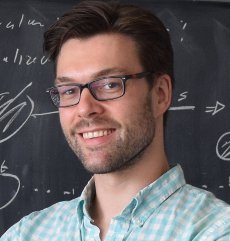
PI: David Curtin (hear name)
Associate Professor
Canada Research Chair in Theoretical Particle Physics
pronouns: he/him
High Energy Theory Group
Department of Physics, MP1113
dcurtin@physics.utoronto.ca
office: +1 416-978-4784
Note: I am on sabbatical Jan - Dec 2025, and may not be physically present at the University of Toronto. Shoot me an email if you need to reach me.
Research
I am a high energy phenomenologist, interested in finding and analyzing theories of particle physics beyond the Standard Model. In other words, I care a lot about trying to figure out where the new physics that we know must exist might be hiding. and helping to discover it.
The areas of research that I'm most active in right this minute include
- Cosmological and astrophysical signatures of complex dark matter. I'm particularly focused on Atomic Dark matter, which has deep theoretical roots in theories of neutral naturalness, and gives rise to rich dynamics that produce mirror stars and dark galactic disks. We explore these predictions with custom N-body, stellar evolution and gas physics codes, with the aim of enabling their discovery in astrophysical observations.
- Solving the (Little) Hierarchy Problem with theories of Neutral Naturalness, like the Twin Higgs. Currently very interested in how they can account for dark matter and (twin) baryogenesis, and what this might teach us about their UV completion and future collider signatures.
- Non-perturbative dark sectors and modeling their detailed physics at colliders and elsewhere to enable discovery.
- Generalized understanding of UV flavour mechanisms that explain the SM quark and lepton masses and mixings, like Froggatt Nielsen Models, and their detailed collider signatures.
- Physics at future colliders, in particular (at the moment) O(1-10) TeV muon or electron colliders.
- Thermal Mass Resummation in Finite Temperature QFT and "precision" predictions for gravitational wave signals from phase transitions in the early universe.
- The MATHUSLA detector for long-lived particles at the LHC. LLPs may be produced at the LHC and other colliders and decay a macroscopic distance displaced from the production point. I am a founding member of the MATHUSLA experimental collaboration to build a dedicated external detector for very long-lived neutral particles.
Resume
2024 - ongoing: Associate Professor, Department of Physics, University of Toronto.
2018 - 2024: Assistant Professor, Department of Physics, University of Toronto.
2014 - 2017: Postdoctoral Research Associate, University of Maryland.
2011 - 2014: Postdoctoral Research Associate, Stony Brook University.
2006 - 2011: PhD, Cornell University. Thesis Advisor: Csaba Csaki.
2005: Bachelor of Science (Honors), University of Melbourne. Thesis Advisor: Raymond Volkas.
2002 - 2004: Bachelor of Science, University of Sydney.
